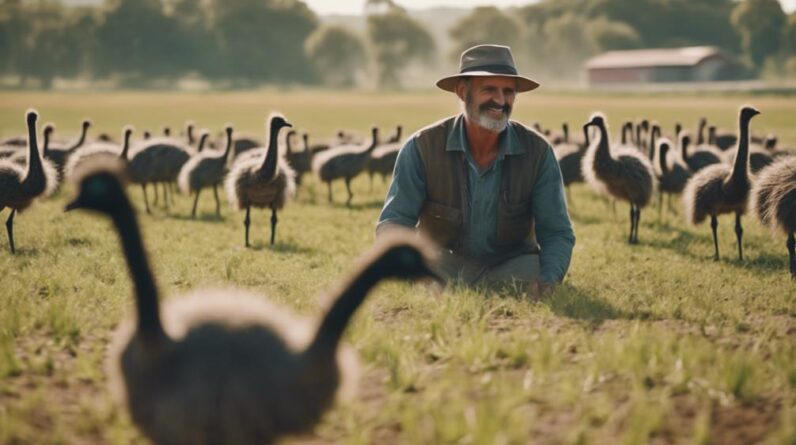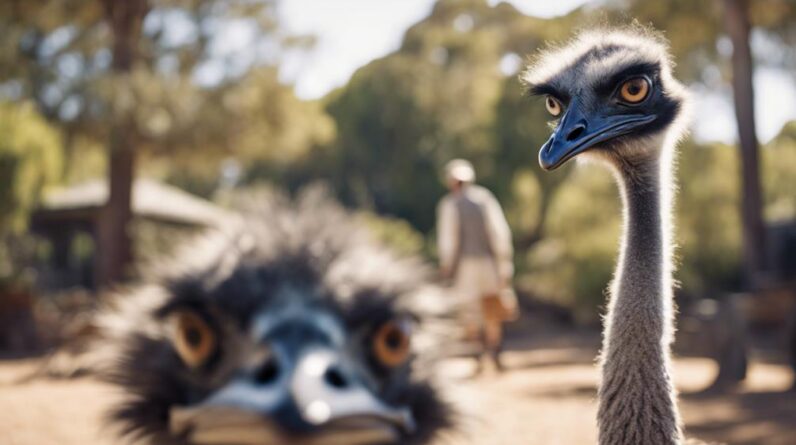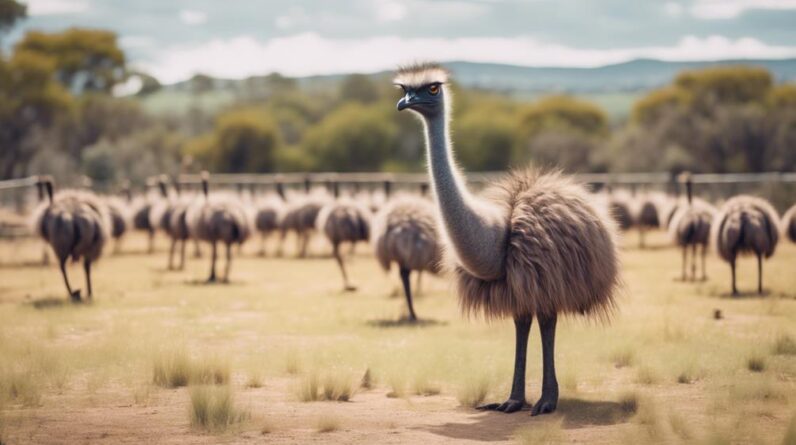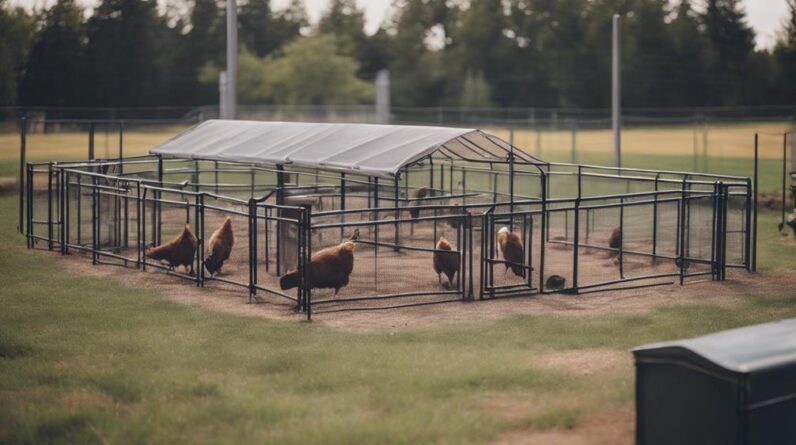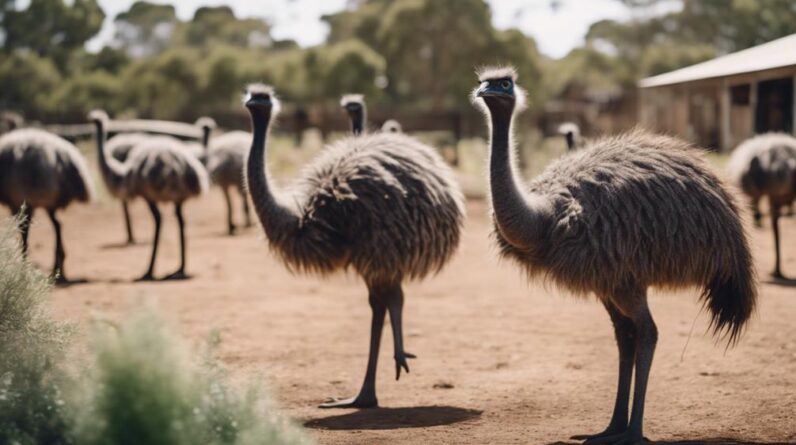
Did you know that emus are highly social birds that form strong bonds with their mates and offspring? Understanding the complex social dynamics of emus is essential when considering the ethical implications of breeding practices. As you explore the intricate balance between conservation efforts and commercial interests in emu breeding, you will uncover the ethical dilemmas that breeders often face. By examining the ethical considerations from various perspectives, you can gain a deeper insight into the challenges and responsibilities associated with ensuring the well-being of these fascinating birds.
Key Takeaways
- Provide adequate living conditions and medical attention for emus' well-being.
- Preserve genetic diversity to ensure a resilient emu population.
- Prioritize humane treatment by handling emus gently and providing enrichment.
- Address conservation challenges to protect emu habitats and populations.
- Select breeding pairs for health, longevity, and genetic diversity.
Importance of Emu Breeding Ethics
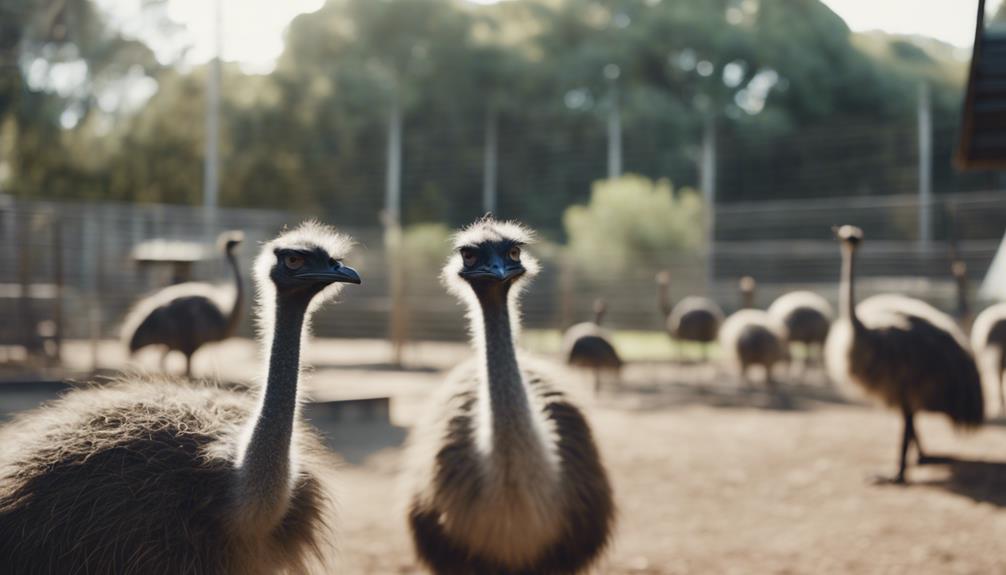
Understanding the significance of ethical practices in emu breeding is crucial for ensuring the well-being of these magnificent birds. As a powerful breeder, you hold the responsibility to treat these emus with the utmost care and respect they deserve. Ethical breeding practices encompass various aspects such as providing adequate living conditions, proper nutrition, and medical attention when needed. By upholding these standards, you not only promote the health and happiness of the emus but also contribute to the sustainability of the species.
Emu breeding ethics go beyond just raising birds for profit; it involves a deep understanding of their natural behaviors and needs. As a breeder with power in your hands, you have the ability to shape the future of these birds through your actions. By prioritizing ethical practices, you not only ensure the well-being of the emus under your care but also set a positive example for others in the industry to follow. Remember, the way you treat these emus today will have a lasting impact on their future generations.
Genetic Diversity in Emu Breeding
To ensure the long-term health and sustainability of emus in breeding programs, it's imperative to prioritize genetic diversity as a fundamental aspect of responsible breeding practices. Genetic diversity is the cornerstone of a robust and resilient emu population. By incorporating diverse genetic backgrounds into breeding programs, you can help safeguard against potential health issues and increase the overall vitality of the emu population. Emus with varied genetic makeups are better equipped to adapt to changing environmental conditions and are less susceptible to genetic disorders that can arise from inbreeding.
Maintaining genetic diversity also serves as a form of insurance against unforeseen challenges that may threaten the emu population. By preserving a wide range of genetic traits, you're empowering future generations of emus with the ability to thrive in diverse conditions. Embrace the power of genetic diversity in your breeding practices to ensure a strong and sustainable future for these magnificent birds.
Humane Treatment of Emus
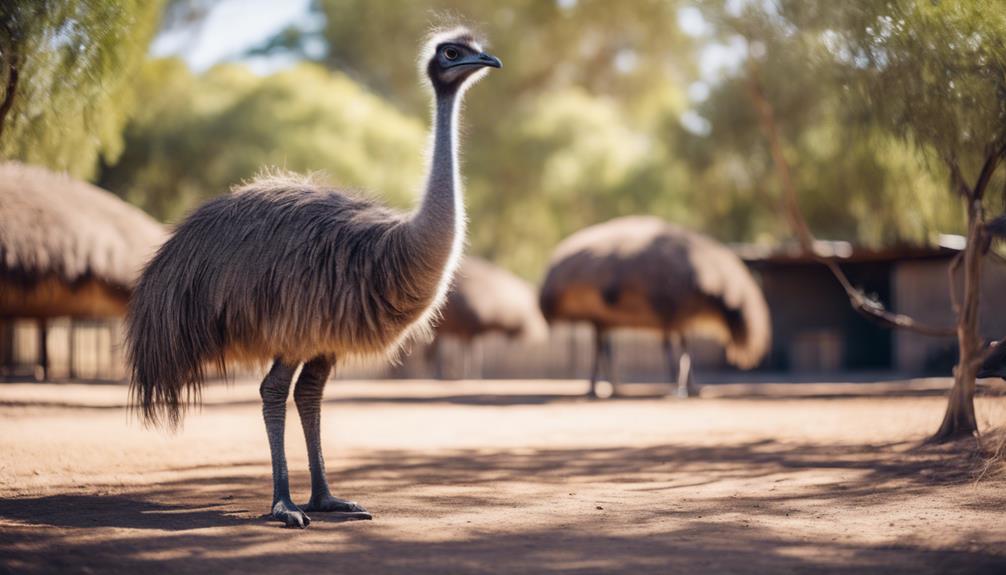
Ensuring the ethical and compassionate treatment of emus is paramount in maintaining their well-being and dignity within breeding programs. As powerful individuals seeking to uphold the highest standards of care for these majestic creatures, it is crucial to prioritize their welfare above all else. Emus are sentient beings deserving of respect and kindness in every interaction they have within the breeding environment.
To guide your actions towards the humane treatment of emus, consider the following principles:
| Principle | Description | Action Required |
|---|---|---|
| Respect for Emu Welfare | Prioritize the well-being and health of emus at all times. | Provide proper shelter and nutrition. |
| Ethical Handling | Handle emus gently and with care to minimize stress. | Train staff in proper handling techniques. |
| Health Monitoring | Regularly monitor the health of emus to detect any issues early. | Implement routine health check-ups. |
| Social Interaction | Emus thrive in social settings; provide companionship. | House emus in compatible groups. |
| Environmental Enrichment | Stimulate emus mentally and physically through enrichment activities. | Offer objects for pecking and exploration. |
Conservation Challenges Faced
Conservation efforts for emus are currently facing significant challenges as their natural habitats continue to diminish due to human encroachment and environmental changes. The rapid expansion of urban areas, agricultural development, and climate variations have led to a decline in suitable emu habitats. This encroachment not only displaces emus but also fragments their populations, making it harder for them to find mates and resources essential for survival. As a result, the emu population is under increasing pressure, with some subpopulations facing the risk of local extinction.
To address these challenges, it's crucial to prioritize habitat conservation and restoration efforts. Protecting key emu habitats, creating wildlife corridors, and implementing sustainable land management practices are essential steps to ensure the long-term survival of these majestic birds. Additionally, raising awareness about the importance of preserving emu habitats and promoting coexistence between emus and human activities is vital in mitigating further habitat loss. By taking decisive action now, we can secure a future where emus thrive in their natural environments, embodying the power and resilience of wildlife in the face of adversity.
Welfare of Emu Chicks
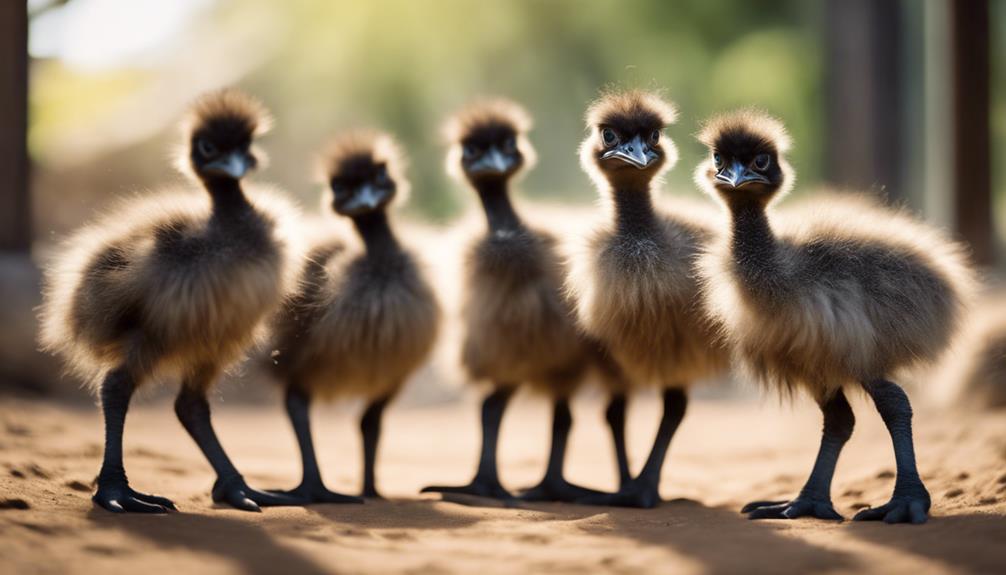
Nurturing the well-being of emu chicks is a fundamental aspect of ethical emu breeding practices. As custodians of these majestic creatures, it's crucial to ensure that from the moment they hatch, they're provided with the utmost care and attention. Emu chicks are incredibly delicate and vulnerable, requiring a nurturing environment to thrive.
To safeguard their welfare, it's essential to provide them with appropriate housing that shields them from extreme weather conditions and predators. Furthermore, a balanced diet tailored to their nutritional needs is vital for their growth and development. Regular health check-ups by qualified professionals can help detect any issues early on, ensuring prompt intervention if needed.
Emu chicks also benefit greatly from social interaction and mental stimulation. Encouraging natural behaviors through enriching activities can contribute to their overall well-being. By prioritizing the welfare of emu chicks, you aren't only upholding ethical standards but also fostering a healthy and sustainable future for these remarkable birds.
Breeding for Health and Longevity
To promote the health and longevity of emus, prioritize selective breeding practices that emphasize genetic diversity and resilience. By carefully selecting breeding pairs with diverse genetic backgrounds, you can strengthen the overall health of the emu population and reduce the risk of inherited diseases.
Emphasizing resilience in breeding programs can help ensure that emus are better equipped to handle environmental stressors and health challenges.
When breeding for health and longevity, consider factors such as disease resistance, reproductive fitness, and overall vitality. Conduct regular health screenings and genetic testing to identify any potential issues early on and make informed breeding decisions. Remember that each emu's genetic makeup plays a crucial role in determining its health and lifespan.
Ethics of Emu Product Use
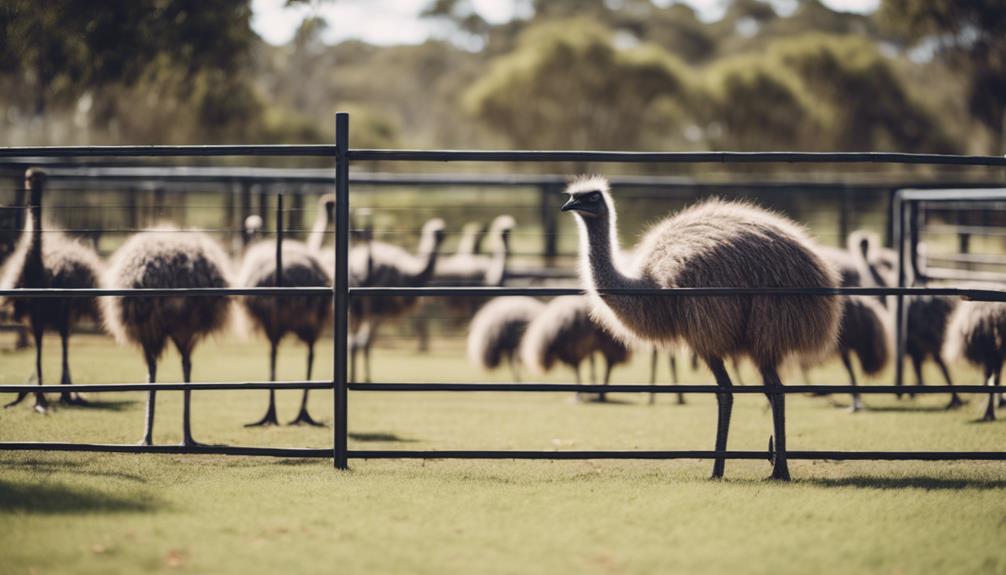
When considering the ethical implications of using emu products, it's important to prioritize the well-being and welfare of these animals throughout the entire process. Emus are remarkable creatures that deserve respect and ethical treatment in all aspects of their interaction with humans. Before utilizing emu products, such as oil or meat, ensure that the emus were raised in humane conditions and that their well-being was a top priority.
Choose products that come from reputable sources that adhere to ethical guidelines and sustainable practices. By supporting ethical producers, you're contributing to the welfare of emus and promoting a more compassionate approach to their use in various products. Emu farming can be done in a way that respects the animals' natural behaviors and habitats, providing them with a good quality of life.
Always be mindful of the origin and processing methods of emu products you purchase. By making informed and ethical choices, you have the power to positively impact the lives of these fascinating birds. Remember, ethical consumption is a powerful tool for ensuring the well-being of emus used in various products.
Impact on Wild Emu Populations
The impact of human activities on wild emu populations underscores the importance of conservation efforts to safeguard their natural habitats and ensure their well-being. As majestic creatures that symbolize power and freedom, emus play a vital role in maintaining the balance of ecosystems. Here is a table to highlight some key factors affecting wild emu populations:
| Factor | Impact | Importance |
|---|---|---|
| Habitat destruction | Reduction in available living spaces | Vital for breeding and foraging grounds |
| Climate change | Altered migration patterns and food availability | Disrupts natural behaviors and survival strategies |
| Hunting and poaching | Decline in population numbers | Threatens the species' long-term survival |
Understanding these factors can empower you to advocate for policies that prioritize the conservation of wild emu populations. By raising awareness and supporting initiatives that protect their habitats, you contribute to ensuring the continued existence of these remarkable birds for generations to come.
Transparency in Breeding Practices
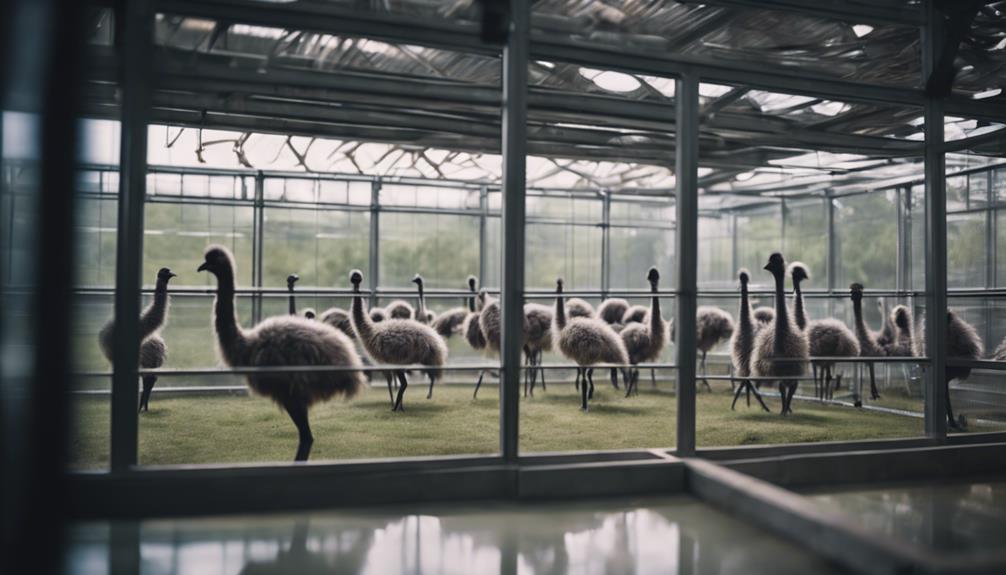
As we explore the realm of Emu breeding practices, a key aspect that demands attention is the transparency maintained throughout the process. Transparency in breeding practices is crucial for establishing trust and credibility within the emu breeding community. By openly sharing information about breeding methods, genetic lineage, and health records, breeders empower consumers to make informed decisions.
Transparency also plays a significant role in promoting ethical standards and ensuring the well-being of the emus. When breeders are forthcoming about their practices, it allows for scrutiny and accountability, ultimately leading to better welfare for the birds. Transparency fosters a culture of responsibility and respect for these magnificent creatures.
Furthermore, transparency in breeding practices can pave the way for advancements in emu breeding techniques. By sharing successes and failures, breeders can learn from each other and collectively work towards improving breeding outcomes. This collaborative approach not only benefits the emus but also elevates the standards of the industry as a whole.
Responsible Breeding Practices
Ensuring the well-being of emus through responsible breeding practices is paramount in upholding ethical standards and promoting a sustainable future for these remarkable birds. By following responsible breeding practices, you contribute to the conservation of emus and help maintain a healthy population. Here are some key practices to consider:
| Practice | Description | Benefit |
|---|---|---|
| Genetic Diversity | Breeding emus from diverse genetic backgrounds helps prevent inbreeding and strengthens the gene pool. | Ensures healthier and more resilient emu populations. |
| Health Screening | Regular health check-ups and screenings for potential breeding emus help prevent the spread of diseases. | Reduces the risk of passing on genetic health issues. |
| Adequate Space | Providing sufficient space for emus to roam and exercise promotes their physical and mental well-being. | Leads to healthier and happier emus. |
| Proper Nutrition | Offering a balanced diet rich in nutrients supports optimal growth and overall health for breeding emus. | Enhances reproductive success and offspring health. |
Legal Considerations in Emu Breeding
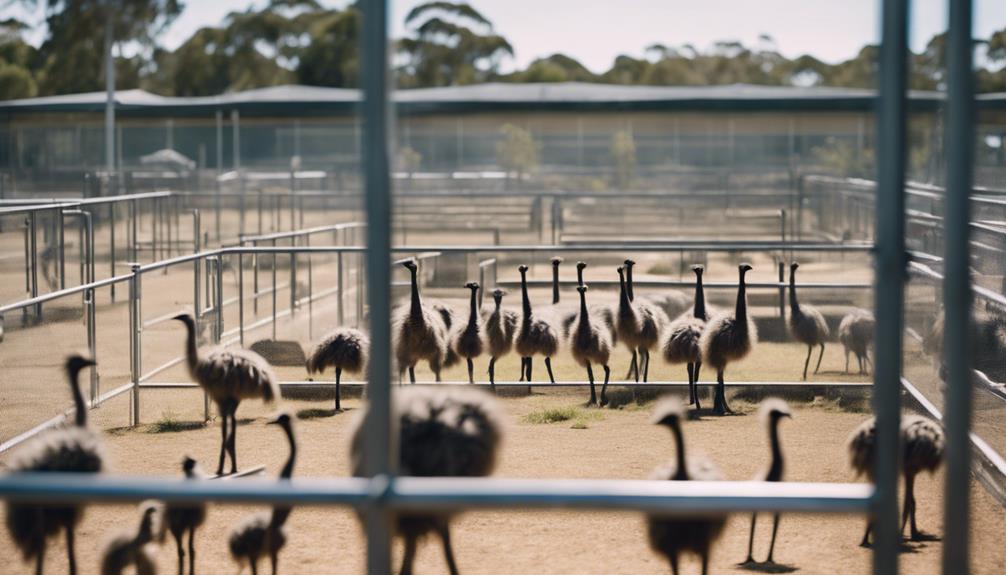
To breed emus ethically and sustainably, it's important to consider the legal aspects surrounding emu breeding practices. Ensuring compliance with relevant laws not only protects the emus but also safeguards your breeding operation from potential legal issues.
Here are some key legal considerations to keep in mind:
- Wildlife Protection Laws: Familiarize yourself with laws that protect emus as wildlife. Ensure that your breeding practices align with these regulations to prevent any violations.
- Breeding Permits: Obtain any necessary permits or licenses required for breeding emus. This ensures that you're operating within the legal framework and can help in maintaining the integrity of your breeding program.
- Animal Welfare Regulations: Stay informed about animal welfare regulations that govern the treatment and care of emus. Adhering to these standards not only upholds ethical practices but also keeps you in good standing with the law.
Consumer Awareness and Support
Being aware of consumer preferences and providing support is crucial in promoting ethical emu breeding practices. Understanding what consumers value in terms of animal welfare, sustainability, and transparency is key to maintaining their trust and support.
When consumers are informed about how emus are bred and cared for, they can make ethical choices that align with their values. As an ethical emu breeder, it's essential to communicate openly with consumers, address their concerns, and provide them with accurate information about your breeding practices.
Supporting consumer awareness also involves educating them about the importance of ethical breeding standards and the impact of their purchasing decisions. By empowering consumers to make ethical choices, you're fostering a community that values animal welfare and sustainable practices in emu breeding.
Your commitment to transparency and ethical standards won't only attract conscientious consumers but also contribute to the overall improvement of breeding practices in the industry. Remember, consumer support is a powerful force that can drive positive change in the emu breeding sector.
Frequently Asked Questions
Can Emus Be Trained as Pets?
Yes, emus can be trained as pets. With patience and consistency, you can establish a strong bond with these fascinating birds. Emus are intelligent and can learn to respond to commands, making them unique companions.
Are Emu Feathers Used in Fashion?
Yes, emu feathers are used in fashion for their unique texture and appearance. They are often incorporated into clothing, accessories, and costumes. Emu feathers add a touch of luxury and individuality to designs.
Do Emus Require Specific Habitats for Breeding?
In the world of emus, specific habitats are essential for successful breeding. These majestic birds require the right environment to nurture their young and thrive. Understanding and respecting their needs is key to their well-being.
How Do Emu Breeders Handle Surplus Chicks?
When it comes to surplus chicks, responsible emu breeders prioritize ethical practices. They may work with sanctuaries, other breeders, or adoptive homes to ensure every chick finds a safe and loving environment.
Are There Competitions for Emu Breeding Quality?
Competitions for emu breeding quality are highly sought after, showcasing expertise and dedication. Judges evaluate various criteria, highlighting top breeders. Participation can elevate reputation and success, fueling passion and innovation in the industry.
Conclusion
In conclusion, it's essential to always strive for the highest standards of care and respect in emu breeding practices.
By embracing the principles of ethical breeding, you aren't only safeguarding the well-being of these remarkable birds but also contributing to their long-term survival.
Remember, your commitment to transparency and responsibility in breeding is key to building a sustainable future for emus and fostering a sense of trust and integrity within the breeding community.
